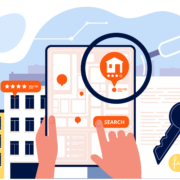Posts
4 Ways to Improve Your Credit Score
/in Buyers, Featured, Financing /by Katie HowellCredit scores are a vital part of getting approved for a loan to buy a home. Although you can get a mortgage with a lower credit score, the better your credit score, the better your loan terms will be. If you’re looking for ways to improve your credit score, look no further. Here are our top tips to improving your score for a better mortgage.
1. Make Payments on Time
Your payment history is one of the biggest impacts on your credit score. The more frequently you pay your bills by the payment deadline, the better your score will be. If you’re behind on your payments, the first step is to get up to date on them.
Then, make sure to continue paying your bills on time and in full, if you can. Either get notifications for when your bills are due or set up automatic payments, so you don’t miss a due date.
2. Pay Off Debt and Keep Low Balances on Credit Cards
Another large determining factor of your credit score is credit utilization, or how much you owe on a credit card compared to your credit limit. Lenders typically look for a ratio of 30% or less. You can positively impact your credit utilization by keeping your credit card balances down or paying off any debt you have on your cards. Calculate your credit utilization here.
3. Only Keep As Many Credit Accounts As Needed, But Don’t Close an Unused Account!
Having a mixture of credit doesn’t necessarily lead to a better credit score. Unnecessary credit can even harm your score by creating inquiries on your account and possibly leading to overspending.
However, if you have an unused account, don’t close it! If the account doesn’t charge you annual fees, closing it could lead to a higher credit utilization ratio.
4. Keep An Eye On Your Credit Report
Make sure to check on your credit reports every so often. If you notice inaccuracies, such as late payments or incorrect amounts owed, these are all factors that can drag down your score. If you notice an inaccuracy, make sure to dispute it right away! Click here for more information on receiving a free credit report.
5 Financial Questions To Ask Yourself Before Buying A Home in Chicago
/in Buyers, Financing /by Cory HallFinances are typically the most intimidating part of the homebuying process. So, here are five financial questions to ask yourself so you feel as empowered as possible.
#1: How Are Your 4 C’s?
Let’s look at loan eligibility or “buying power.” Most lenders evaluate a person’s buying power based on four elements called “the four C’s.” They are capacity, capital, collateral and credit.
Before you buy a home, make sure you are well-versed on the status of or know where and how to check on these.
- Capacity: This is your ability to take on a mortgage or pay back a loan. Income, savings and monthly debt payments are some of the factors that affect capacity.
- Capital: This is the amount of money or savings you have readily available. Think of it as your personal reserves that are not tied to income. Closings cost funds and your down payment funds are types of capital!
- Collateral: When you take out a loan, this is the monetary value of the property you’re securing against it.
- Credit: This is based on your credit score and history. A lender wants to know if you have a history of paying other debts on time and in full.
#2: Who’s On Your Team?
When you’re ready to buy a home or begin planning for a purchase in the future, assemble a team of professionals who will have your back and provide expert counsel. They include:

- A Lender
- A Real Estate Attorney
- An Inspector
- A REALTOR®
#3: What’s Important To You In Your Home and Neighborhood?
Begin creating a list of home and neighborhood features you consider non-negotiables.
For your neighborhood, rank access to public transportation, parking, green space, retail and restaurant density and proximity to schools or hospitals. Depending on what you prefer, this will narrow down building types located in neighborhoods that include your must-haves.
For example, several neighborhoods in Chicago are known for specific architectural eras. Bungalows, two-flats, greystones and courtyard buildings all require different financial considerations when it comes to maintenance.
For your property, consider cost-associated expenses like central AC, laundry, elevators, private outdoor space like porches or backyards and parking garages. It’s easy to just think of the desired number of bedrooms or bathrooms, but these aren’t the only features that will influence the cost of the properties that will fit your needs!
Once you have your ideal neighborhood and home in mind, you can begin to get an idea of home prices in those areas.
#4: What if…?
Look at your financial ability to handle emergencies, life changes and other “what if” situations. Build an untouchable emergency fund with at least three to six months of monthly expenses shored up.
Not only will this give you a peace of mind when you buy your home, it will also boost your capital and likely positively influence your buying power.
Don’t wait to ask yourself what if! Take charge of your finances with these hypotheticals.
#5: Where Do You See Yourself Five Years From Now?
Take a zoomed out look at your professional and personal goals, then apply your housing needs to these milestones. Do you see career changes or promotions in the future?
It may be to your benefit to consider a property with more space than you presently need, because you anticipate having children or getting married. Does the neighborhood you like now sound like it will still be enjoyable to live in or fit your lifestyle growth?
It may also be to your financial benefit to wait at least five years for your home value to increase or for you to build equity or ROI on your investment. When in doubt, ask your REALTOR® what kinds of life milestones in their experience influence home purchase decisions.
16 Helpful Inspection Report Questions For Buyers
/in Buyers, Must Read, Navigating the Transaction /by Cory HallCongratulations, your offer has been accepted! You now have entered the attorney review period. Typically, a home inspection is scheduled within five days of the accepted offer. An inspection report is an inspector’s documented recommendations and observations of the property’s potential need for repairs. Remember, your inspector’s job is to find any reasonably discoverable issues in your home.
While inspections are not mandatory, we highly recommend utilizing this affordable resource so you can continue through the buying process as informed as possible. The inspection report can be intimidating! We put together prompts to help you feel empowered to ask everyone on your “team” actionable questions.
Questions you should ask your REALTOR®:
- Do you have any reputable inspectors you would recommend?
- What are three things you advise I look out for in particular?
- Will you be able to attend the inspection with me?
- What are common issues or challenges to see in this property type?
- In your opinion, what are the most important repairs I should focus on or prioritize?
- [in the case of a short-sale] When should we schedule the appraisal?
Questions you should ask your inspector:
- What do you check and what don’t you check?
- How soon after the inspection will I receive the inspection report?
- Are you available for follow-up calls if I have questions about the report?
- Are there any issues of note on the seller’s property disclosure statement?
Questions you should ask your attorney:
- From the seller’s perspective, what requests are they likely to push back on and what are they likely to consider?
- How many requests is too many?
- Should I ask for a credit or should I ask for a warranty?
Questions you should ask yourself:
- How much repair am I comfortable taking on myself?
- What are my priorities?
- What items am I willing to give up on during the negotiation?
In the end, the inspection report is another tool in your homebuying toolbelt. If you’re feeling anxious, your REALTOR® is always available to provide perspective and experience.





